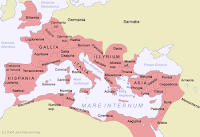The Founding of [Rome] Roman Architecture –
 |
| Map of Roman Empire |
· 1000 B.C.E Balkan settlers moved into the Italian peninsula.
300 years later Etruscans moved into Tuscany.
300 years later Etruscans moved into Tuscany.
· Rome’s rule stretched from Gibraltar to Gaul.
· 46 B.C.E Julius Caesar became dictator.
o Assassinated and nephew Octavian took rule.
· Octavian defeated and claimed Egypt.
Began to fall apart during the reign of Marcus Aurelius.
Empire came together once more during the rule of Constantine in 324 C.E.
· An architecture of space (internal and outdoor) to a large extent.
· The essence of Roman architecture was to intentionally shape public spaces.
o The Pantheon – had a span of 142.5 feet.
o Best symbolizes the Roman enclosure of space and the powerful effect.
o Temple to all the gods.
o Included a dome to symbolize the universe.
· The basilica was designed to include a space large enough to hold legal matters and fit a vast amount of people.
o Internal encircling colonnade with an apse, where the judges would sit.
o At the geometric center of the apse was an alter for the emperor.
· Basilica Ulpia measured 385 by 182 feet (not including the apses).
· The Basilica of Maxentius , begun in 307 C.E., was finished by Constantine in c. 325
o Public bath constructed of concrete.
o Circulation space measured 265 by 83 feet.
o Included 3 huge groin vaults and 3 chambers on each side.
· The founding of Rome (and Roman architecture) is important to the world today because it created a precedent for the way architecture is designed today.
o It was a model for well building and included:
§ Useful arrangement.
§ Stability and solidity.
§ And it created a positive effect on the people.
· Each building was designed with a specific purpose and told a story.
· It set the bar in building for the mass on a large scale.
 |
| Plan of the Basilica |
 |
| The Pantheon |
Nice job!
ReplyDelete